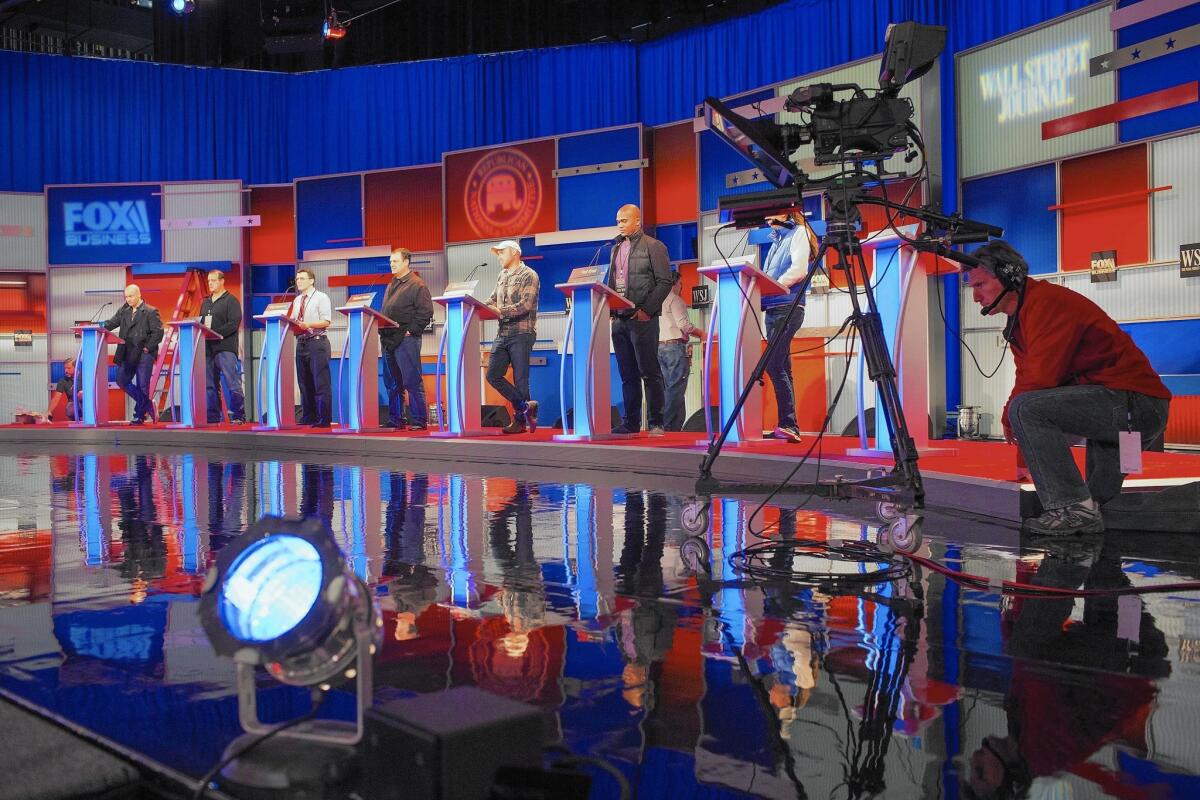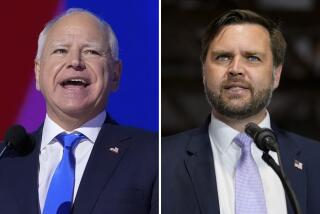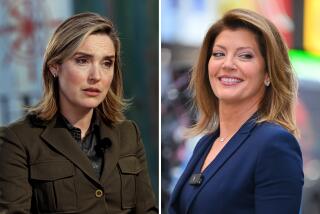In Republican debate, moderators will be in the spotlight

Workers test the setup at the Milwaukee Theatre before Tuesday’s Republican presidential debate.
reporting from MILWAUKEE — Though the moderators of Tuesday’s Republican presidential debate will try to spark discussion on taxes and the economy, the focus instead will probably be on how the candidates react to the questioners themselves.
Ahead of the second debate in less than two weeks, GOP presidential aspirants arrive in this city nestled on the shores of Lake Michigan mostly unified in their disdain for the tone of the last debate, which at times spiraled into testy exchanges between the candidates and moderators. Among other jabs, one asked Donald Trump whether his is a “comic book” campaign.
But the networks largely ignored candidates’ subsequent demands for more control over the debate format, leading campaigns to seize on an “us versus them” narrative before Tuesday’s debate. That may serve campaigns as they try to win over supporters in the final months before the early nominating contests, said Katie Packer, a Republican strategist who served as deputy campaign manager for Mitt Romney in 2012.
“The candidates and their teams recognize there is a high level of speculation toward the media coming from Republican primary voters,” Packer said. “If they get tossed a difficult question or one that challenges their record, they can hide behind this shield of blaming the media for being biased.”
Indeed, some candidates might look for that opening Tuesday night while onstage at the Milwaukee Theatre.
Retired neurosurgeon Ben Carson has faced intense examination in recent days over some of his biographical anecdotes, including whether he was offered a scholarship to attend West Point, which he says he was, and courses he took while at Yale University. Carson blamed the media for “special scrutiny” of his campaign at a time when he has momentum.
Carson and Trump — both political neophytes who appeal to a cross-section of primary voters seeking outsider candidates — are leading the crowded GOP field. In a USC Dornsife/Los Angeles Times national poll released Sunday, Trump drew the support of 25% of respondents and Carson 21%.
Their popularity may be a result of decades of Republican messaging, said Lowell Barrington, chairman of the political science department at Marquette University in Milwaukee.
“For several decades, rhetoric among Republicans has focused on attacking not only government spending but also government institutions and officials themselves,” he said. “When a group of voters hear, year after year, that people in government are corrupt ... it should not be a surprise when those voters reject the candidates in their own party with the most political experience, at least early on in the primary season.”
The three Republican debates have garnered strong interest in the form of millions of viewers, making them prime opportunities for candidates to rise.
Sens. Ted Cruz of Texas and Marco Rubio of Florida both performed strongly in the last debate and have seen bumps in polling since. Rubio was at 14% in the USC/Times poll and Cruz at 12%.
Rubio also netted the backing of prominent billionaire GOP donor Paul Singer and a handful of endorsements from his colleagues in the Senate.
In the last debate, the most notable exchange came between Rubio and his onetime ally, former Florida Gov. Jeb Bush.
When Bush sought to castigate Rubio for his poor Senate attendance record, Rubio cut off the assault with a counterpunch.
“The only reason that you’re doing it now is because we’re running for the same position and someone has convinced you that attacking me is going to help you,” he told Bush.
Bush’s debate performance was widely panned and forced his campaign to launch a comeback tour in New Hampshire, an early-nominating state seen as crucial to his strategy. But Republican activists there were lukewarm to his effort, making a strong showing in Tuesday’s forum even more crucial for Bush.
Bush has admitted that the debates’ setup favors other candidates who do better at drawing attention to themselves. But he will take the stage alongside only seven others Tuesday, a smaller group than in any of the previous debates, and that could give him an opening for more screen time.
For his part, Cruz helped lead the charge against journalists in the last debate, saying the moderators’ questions “illustrate why the American people don’t trust the media.”
TRAIL GUIDE: All the latest news on the 2016 presidential campaign >>
His broadside came in response to a question about the debt limit.
“Debates ought to vote on the substance and on comparing the records and policy ideas and visions of the different candidates,” Cruz said Saturday before addressing the Texas Federation of Republican Women convention in Lubbock. “You can see a difference when you have moderators that are, frankly, coming from a very different political perspective.”
Candidates are simply going after the media for getting in the way of their campaign messages, Barrington said.
“They continue to see such attacks as beneficial. They are part of a narrative that the base of the Republican Party agrees with,” he said, adding that he expects candidates to continue to portray the media as out to get them.
Packer warned, though, that eventually candidates will have to engage more substantively with the media to reach voters and “to show true differences” among one another.
Also on the stage for Tuesday’s debate are former Hewlett-Packard Inc. Chief Executive Carly Fiorina, Sen. Rand Paul of Kentucky and Ohio Gov. John Kasich.
Two hopefuls who will be missing for the first time from the main debate will be New Jersey Gov. Chris Christie and former Arkansas Gov. Mike Huckabee, both of whom failed to meet the bar of 2.5% support in recent polls to be included. They’ll instead appear in an earlier debate alongside two other lower-polling candidates, Louisiana Gov. Bobby Jindal and former Pennsylvania Sen. Rick Santorum.
Twitter: @kurtisalee
Times staff writer Lisa Mascaro in Lubbock, Texas, contributed to this report.
MORE POLITCAL COVERAGE
Why ‘Late Night’s’ Seth Meyers has ‘nothing but sympathy’ for debate moderators
What the candidates at the Republican debate must do to make their mark
Sanders pushes hard for Latino support but faces tough climb against Clinton
More to Read
Sign up for Essential California
The most important California stories and recommendations in your inbox every morning.
You may occasionally receive promotional content from the Los Angeles Times.











